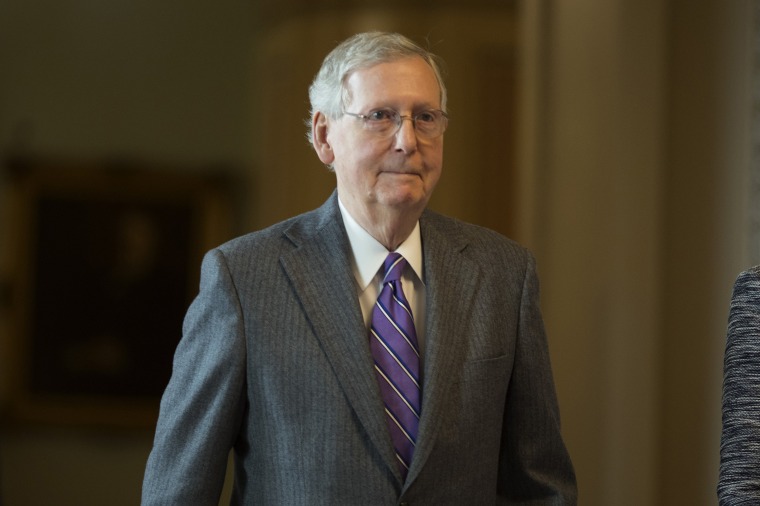WASHINGTON — Despite public pressure and a directive from the president, Congress has no plans to take up gun legislation in the immediate future.
Senate Majority Leader Mitch McConnell said Thursday afternoon that no gun-related legislation would come up next week, including a narrow bipartisan proposal that would attempt to shore up the National Instant Background Check System.
“We’d love to do that at some point,” McConnell said in a brief hallway interview with reporters. “I’m hoping that there’s a way forward.”
McConnell has given no indication when — or if — he would bring up legislation in the aftermath of the Marjory Stoneman Douglas High School Valentine’s Day shooting that killed 17 people. He has said that he won’t bring up legislation until it is guaranteed to pass with the support of at least 60 senators.
The Fix NICS bill, which would incentivize state and federal agencies to upload data to the National Instant Background Check system, has 50 co-sponsors at the moment, and one of them, Sen. John Cornyn, R-Texas, said it would pass with the support of 80 senators if it was ever put on the floor.
Earlier in the week, Cornyn said it would be a “travesty” if the Senate didn't begin debating legislation before the end of the week. On Thursday, he added, "I also said the timeline is the next mass shooting and if we don’t do something before that then there’s going to be a heavy price to be paid.”
But after a wild, televised meeting at the White House with lawmakers Wednesday where President Donald Trump appeared to support many of the proposals that Republicans oppose, GOP lawmakers have been unable to come to consensus on what they support.
“We’ve got a lot of disagreement on the Republican side and I would be surprised if anything moved anytime soon,” Sen. John Kennedy, R-La., said.
Trump endorsed legislation by Sens. Pat Toomey, R-Penn., and Joe Manchin, D-W.V., introduced after the Sandy Hook mass shooting in 2012. It would expand background checks to be required at for gun show purchases and online sale. But Republicans are still mostly opposed.
Sen. John Thune, R-S.D., said that, even after Parkland, he doesn’t support the legislation.
“We voted that down before so I don’t know why we would need to have that vote again unless something changed,” Thune said.
Meanwhile, Sen. Marco Rubio, R-Fla., met with parents of Parkland victims in the Capitol Thursday shortly after they met with Trump at the White House. He also announced his support for what he called “comprehensive” legislation that doesn’t address guns directly, but that he says would detect a potential mass school shooter. It would allow restraining orders for potential threats and prosecuting people who are prohibited from buying guns but do so anyway, and to incentivize schools to report threatening students to law enforcement.
“I’m fine with having debates on the other issues regarding gun laws — but these are the issues we have broad agreement on. Let’s do those let’s not allow those to be held up by the broader debate on some of the other things,” Rubio told NBC News.
Democrats, meanwhile, are hoping to inject into any gun debate discussion about semiautomatic weapons, a debate most Republicans don’t want to have.
Sen. Kamala Harris, D-Calif., said the matter is urgent.
“Deferring the conversation is not going to defer the issue, it remains an issue. Whether or not we have this conversation will be the difference between whether or not there will be rules in place around who can access to a weapon of war,” Harris said.
